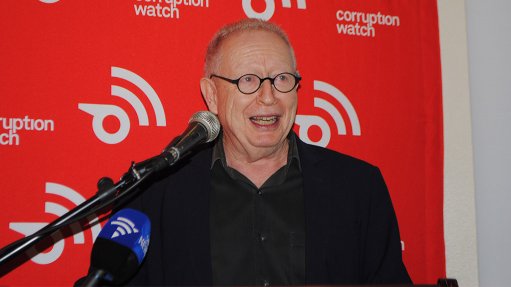
Corruption Watch executive director David Lewis
South Africa’s score on Transparency International’s (TI’s) Corruption Perceptions Index (CPI) for 2015 was unchanged at 44; however, the country’s rank shifted favourably from sixty-seventh to sixty-first, indicating that perceptions around the extent of corruption in the country were stabilising somewhat.
The CPI rated the perceived level of public sector corruption on a scale of zero to 100, where zero meant that a country was perceived as being highly corrupt and 100 that a country was perceived to be very clean.
“The good news is that for the second year in succession, our score, as measured by the CPI, has remained the same and our ranking has improved slightly.
“The bad news is that we are still ranked among those countries perceived to have a serious corruption problem, with our ranking perilously close to those countries suffering from endemic corruption,” commented Corruption Watch executive director David Lewis.
Sub-Saharan Africa, meanwhile, scored 33 in 2015, with the region’s top scorer Botswana, scoring 63 points on the index, while Somalia was the worst performer in the region, having scored eight points.
Eighty-seven per cent of countries in the region scored less than 50.
“This year’s index presents a worrying picture – with 40 of 46 countries showing a serious corruption problem and no improvement for continental powerhouses Nigeria and South Africa,” said TI, noting that issues such as Ebola and rising terrorism were further exacerbating the situation.
Indicators for rule of law and justice in the region scored “particularly badly”. While some governments were reducing risks for business, there was little change for citizens – as systemic corruption left many countries struggling to uphold the basic rule of law.
TI noted, however, that progress was possible. “Looking at the different areas covered by the index, we can see particular improvement around transparency in financial management – good news for the companies operating in the region.”
Overall, a number of countries also improved in recent years, notably Senegal, which rose significantly since the government introduced a series of anticorruption measures.
“As the new Sustainable Development Goals act as a catalyst for strengthening governance, there’s hope other countries could follow,” TI said.